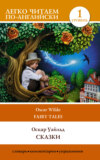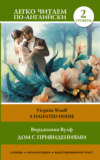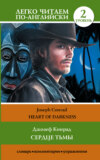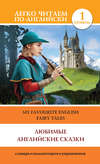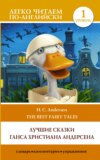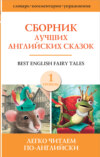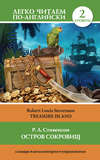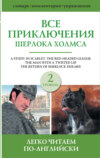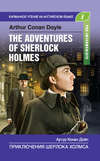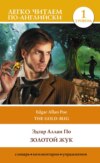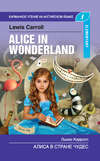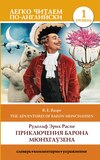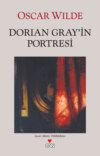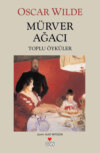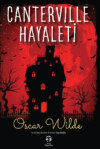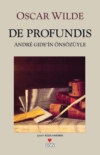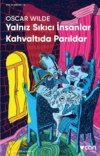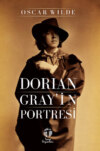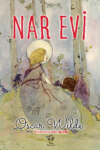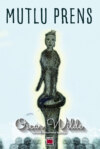Kitabı oku: «Сказки / Fairy Tales», sayfa 2
‘In a wood that is nigh to the gate of this city of Giaours there are three pieces of gold. One is of white gold, and another is of yellow gold, and the gold of the third one is red. Today you must bring me the piece of white gold. If you don’t bring it, I will beat you with a hundred stripes16. Get away quickly! At sunset I will wait for you at the door of the garden. Remember to bring me the white gold, or I will punish you. You are my slave, I bought you for the price of a bottle of sweet wine.’
And he bound the eyes of the Star-Child with the scarf of figured silk, and led him through the house, and through the garden of poppies, and up the five steps of brass. Then he opened the little door with his ring and pushed him in the street.
The Star-Child went out of the gate of the city, and came to the wood.
This wood looked very nice, it seemed full of birds and of flowers. The Star-Child entered it gladly. But soon its beauty disappeared, and wherever he went harsh briars and thorns shot up from the ground and encompassed him. Evil nettles stung him, and the thistle pierced him with daggers. And he could not find the piece of white gold anywhere, though he sought for it from morn to noon, and from noon to sunset. At sunset he wept bitterly and decided to go home, for it was time to return.
But when he reached the outskirts of the wood, he heard from a thicket a cry. The Star-Child forgot his own sorrow and ran back to the place, where he saw there a little Hare in a hunter’s trap.
The Star-Child had pity on it, and released the Hare, and said,
‘I am a slave, but I can free you.’
The Hare answered him:
‘Surely you gave me freedom. What can I give you in return?’
The Star-Child said to it,
‘I look for a piece of white gold, but I can’t find it anywhere. If I don’t bring it to my master he will beat me.’
‘Come with me,’ said the Hare, ‘and I will lead you to it. I know where it is, and for what purpose.’
So the Star-Child went with the Hare, and lo! In the cleft of a great oak-tree he saw the piece of white gold. He was filled with joy, and seized it, and said to the Hare,
‘You rendered back my service and repaid the kindness many times over!’
‘As you deal with me,’ answered the Hare, ‘so I deal with you.’
The Hare ran away swiftly, and the Star-Child went towards the city.
Now at the gate of the city there was a leper. Over his face hung a cowl of grey linen. Through the eyelets his eyes gleamed like red coals. When he saw the Star-Child, he struck upon a wooden bowl, and clattered his bell, and called out to him, and said,
‘Give me a piece of money, or I must die of hunger. They thrust me out of the city, and there is no one who has pity on me.’
‘Alas!’ cried the Star-Child, ‘I have but one piece of money in my wallet, and if I don’t bring it to my master he will beat me, because I am his slave.’
But the leper entreated him, and prayed of him, till the Star-Child had pity, and gave him the piece of white gold.
And when he came to the Magician’s house, the Magician opened to him, and said to him,
‘Do you have the piece of white gold?’
The Star-Child answered,
‘I don’t have it.’
So the Magician beat him, and set before him an empty trencher, and said, ‘Eat,’ and an empty cup, and said, ‘Drink’. After that he pushed him again into the dungeon.
In the morning the Magician came to him, and said,
‘If today you don’t bring me the piece of yellow gold, I will surely keep you as my slave, and give you three hundred stripes.’
So the Star-Child went to the wood, and all day long he searched for the piece of yellow gold. But he could find it nowhere. At sunset he sat down and began to weep. Soon the little Hare came to him.
The Hare said to him,
‘Why do you weep? And what do you seek in the wood?’
The Star-Child answered,
‘I look for a piece of yellow gold. If I don’t find it my master will beat me, and keep me surely as a slave.’
‘Follow me,’ cried the Hare.
It ran through the wood till it came to a river. At the bottom of the river there was the piece of yellow gold.
‘How shall I thank you?’ said the Star-Child, ‘for lo! You succour me for the second time.’
‘But you had pity on me first,’ said the Hare, and ran away swiftly.
The Star-Child took the piece of yellow gold, and put it in his wallet, and hurried to the city. But the leper saw him again, and ran to meet him, and knelt down and cried,
‘Give me a piece of money or I shall die of hunger.’
The Star-Child said to him,
‘I have in my wallet but one piece of yellow gold. If I don’t bring it to my master he will beat me and keep me as his slave.’
But the leper entreated him sore, so that the Star-Child had pity on him, and gave him the piece of yellow gold.
When the Star-Child came to the Magician’s house, the Magician opened to him, and said to him,
‘Do you have the piece of yellow gold?’
And the Star-Child said to him,
‘No, I don’t have it.’
So the Magician beat him, and loaded him with chains, and cast him again into the dungeon.
In the morning the Magician came to him, and said,
‘If today you bring me the piece of red gold I will set you free17. But if you don’t bring it I will slay you.’
So the Star-Child went to the wood, and all day long he searched for the piece of red gold. But he could find it nowhere. At evening he sat down and wept. Again the little Hare came to him.
The Hare said to him,
‘The piece of red gold that you seek is in the cavern that is behind you. Therefore weep no more but be glad.’
‘How shall I reward you?’ cried the Star-Child, ‘for lo! You succour me for the third time.’
‘But you had pity on me first,’ said the Hare, and ran away swiftly.
The Star-Child entered the cavern, and in its farthest corner he found the piece of red gold. So he put it in his wallet, and hurried to the city. And the leper saw him again, stood in the centre of the road, and cried out, and said to him,
‘Give me the piece of red gold, or I must die!’
And the Star-Child had pity on him again, and gave him the piece of red gold. He said,
‘Your need is greater than mine.’
Yet was his heart heavy, for he knew what evil fate awaited him.
But lo! As he passed through the gate of the city, the guards bowed down and said,
‘How beautiful is our lord!’ and a crowd of citizens followed him, and cried out, ‘Surely there is none so beautiful in the whole world!’
The Star-Child wept, and said to himself,
‘They just mock me, they just laugh at my misery.’
The concourse of the people was so large, that he lost his way, and found himself in a great square, in which there was a palace of a King.
The gate of the palace opened, and the priests and the officers of the city ran forth to meet him. They abased themselves before him, and said,
‘You are our lord, and the son of our King!’
The Star-Child answered,
‘I am no king’s son, but the child of a poor beggar-woman. You say that I am beautiful, but I know that I am ugly.’
Then the warrior with the helmet with a lion held up a shield, and cried,
‘Is not my lord beautiful?!’
The Star-Child looked, and lo! His face was very nice again, and his beauty came back to him. The priests and the officers knelt down and said to him,
‘It is prophesied that on this day our ruler comes. Therefore, let our lord take this crown and this sceptre, and be our King.’
But the Star-Child said to them,
‘I am not worthy, because I denied my mother. I must find her, and ask for her forgiveness.
Therefore, let me go, for I must wander again over the world. I may not stay here, though you bring me the crown and the sceptre.’
And he turned his face from them towards the street that led to the gate of the city, and lo! Amongst the crowd that pressed round the soldiers, he saw the beggar-woman who was his mother, and at her side stood the leper.
A cry of joy broke from his lips, and he ran over, and knelt down. He kissed the wounds on his mother’s feet, and wet them with his tears. He bowed his head in the dust, and sobbed, and said to her:
‘Mother, I denied you in the hour of my pride. Accept me in the hour of my humility. Mother, I gave you hatred. Please give me love. Mother, I rejected you. Receive your child now.’
But the beggar-woman did not answer him.
He reached out his hands, and clasped the white feet of the leper, and said to him:
‘I gave you of my mercy thrice. Bid my mother speak to me once.’
But the leper answered him not a word.
And he sobbed again and said:
‘Mother, my suffering is greater than I can bear. Give me your forgiveness, and let me go back to the forest.’
And the beggar-woman put her hand on his head, and said to him, ‘Rise’. Then the leper put his hand on his head, and said to him, ‘Rise,’ also.
And the Star-Child rose up from his feet, and looked at them, and lo! They were a King and a Queen.
And the Queen said to him,
‘This is your father whom you succoured.’
And the King said,
‘This is your mother whose feet you washed with your tears.’
And they fell on his neck and kissed him, and brought him into the palace. They clothed him in fair raiment, and set the crown upon his head, and the sceptre in his hand. And he became the rule. He showed much justice and mercy to all. He banished the evil Magician, and sent many rich gifts to the Woodcutter and his wife and their children.
He was not cruel to bird or beast anymore, but taught love and kindness and charity, He gave bread to the poor, and he gave raiment to the naked. There was peace and plenty in his land.
But he did not rule long, and in three years he died. And he who came after him ruled evilly.
The Happy Prince
The statue of the Happy Prince stood on a tall column, above the city. He was gilded all over with thin leaves of gold. He had two bright sapphires for eyes. A large red ruby glowed on his sword-hilt18. The people admired him.
“He is as beautiful as a weathercock,” remarked one of the Town Councillors; “only not quite so useful,” he added. He was afraid to look unpractical, which he really was not.
“Why can’t you be like the Happy Prince?” asked a sensible mother of her little boy who cried all day. “The Happy Prince never cries for anything.”
“I am glad there is someone in the world who is quite happy,” muttered a disappointed man as he gazed at the wonderful statue.
“He looks just like an angel,” said the Charity Children19 when they came out of the cathedral in their bright scarlet cloaks and their clean white pinafores.
“How do you know?” said the Mathematical Master, “did you ever see one?”
“Ah! We did, in our dreams,” answered the children.
The Mathematical Master frowned and looked very severe.
One night a little Swallow flew over the city. His friends flew away to Egypt six weeks ago, but he stayed, because he was in love with the most beautiful Reed. He met her early in the spring as he flew down the river after a big yellow moth. He was so attracted by her slender waist that he stopped to talk to her.
“Shall I love you?” said the Swallow, who liked to come to the point at once.
The Reed made him a low bow. So he flew round and round her, touched the water with his wings, and made silver ripples. This was his courtship, and it lasted all through the summer.
“It is a ridiculous attachment,” twittered the other Swallows; “she has no money, and too many relations”.
Indeed the river was full of Reeds. Then, when the autumn came the birds all flew away.
After that he felt lonely, and began to tire of his lover.
“She can’t speak,” he said, “and I am afraid that she is a coquette, because she like to flirt with the wind.”
And certainly, whenever the wind blew, the Reed made the most graceful curtseys.
“I admit that she is domestic,” he continued, “but I like to travel, and my wife, consequently, must like to travel also.”
“Will you come away with me?” he said finally to her; but the Reed shook her head. She was attached to her home.
“You trifle with me,” he cried. “I will fly to the Pyramids. Good-bye!” and he flew away.
All day long he flew, and at night-time he arrived at the city.
“This is the place to rest,” he said; “I hope the town is good for me.”
Then he saw the statue on the tall column.
“I will stay there,” he cried; “it is a fine position, with plenty of fresh air.”
So he alighted just between the feet of the Happy Prince.
“I have a golden bedroom,” he said softly to himself as he looked round, and he prepared to go to sleep. But just as he put his head under his wing a large drop of water fell on him.
“What a curious thing!” he cried; “there is not a single cloud in the sky, the stars are quite clear and bright, and yet it rains. The climate in the north of Europe is really dreadful. The Reed liked the rain, but that was merely her selfishness.”
Then another drop fell.
“What is the use of a statue if it cannot keep the rain off20?” he said; “I must look for a good chimney-pot21,” and he determined to fly away.
But before he opened his wings, a third drop fell, and he looked up, and saw – Ah! what did he see?
The eyes of the Happy Prince were filled with tears, and tears ran down his golden cheeks. His face was so beautiful in the moonlight that the little Swallow was filled with pity.
“Who are you?” he said.
“I am the Happy Prince.”
“Why do you weep then?” asked the Swallow; “you drench me.”
“When I was alive and had a human heart,” answered the statue, “I did not know what tears were. I lived in the Palace of Sans-Souci, where sorrow is not allowed to enter. In the daytime I played with my companions in the garden. In the evening I led the dance in the Great Hall. There was a high wall round the garden, but I never asked what lay beyond it. Everything about me was so beautiful. My courtiers called me the Happy Prince, and happy indeed I was, if pleasure is happiness. So I lived, and so I died. And now I am dead. They set me up here. I can see all the ugliness and all the misery of my city. Though my heart is made of lead yet I weep.”
“What! is he not solid gold?” said the Swallow to himself. He was too polite to make any personal remarks aloud.
“Far away,” continued the statue in a low musical voice, “far away in a little street there is a poor house. One of the windows is open, and through it I can see a woman at a table. Her face is thin and worn. She has coarse, red hands, all pricked by the needle. She is a seamstress. She embroiders passion-flowers22 on a satin gown for the loveliest of the Queen’s maids-of-honour23 to wear at the next Court-ball. Her little boy is ill. He lies in a bed in the corner of the room. He has a fever, and he asks for oranges. His mother has nothing to give him but river water. He cried. Swallow, Swallow, little Swallow, will you not bring her the ruby out of my sword-hilt? My feet are fastened to this pedestal and I cannot move.”
“My friends wait for me in Egypt,” said the Swallow. “They fly up and down the Nile, and talk to the large lotus-flowers. Soon they will go to sleep in the tomb of the great King. The King is in his painted coffin. He is wrapped in yellow linen, and embalmed with spices. Round his neck is a chain of pale green jade, and his hands are like withered leaves.”
“Swallow, Swallow, little Swallow,” said the Prince, “will you not stay with me for one night, and be my messenger? The boy is so thirsty, and the mother so sad.”
“I don’t think I like boys,” answered the Swallow. “Last summer, when I stayed on the river, there were two rude boys, the miller’s sons. They always threw stones at me. They never hit me, of course; we swallows fly well. But still, it was a mark of disrespect.”
But the Happy Prince looked so sad that the little Swallow was sorry.
“It is very cold here,” he said; “but I will stay with you for one night, and be your messenger.”
“Thank you, little Swallow,” said the Prince.
So the Swallow picked out the great ruby from the Prince’s sword, and flew away with it in his beak over the roofs of the town.
He passed by the cathedral tower with the white marble angels. He passed by the palace and heard the sound of music. A beautiful girl came out on the balcony with her lover.
“How wonderful the stars are,” he said to her, “and how wonderful is the power of love!”
“I hope my dress will be ready in time for the State-ball,” she answered; “I ordered passion-flowers to be embroidered on it; but the seamstresses are very lazy.”
He passed over the river, and saw the lanterns on the masts of the ships. He passed over the Ghetto, and saw the old Jews. They weighed out money in copper scales. At last he came to the poor house and looked in. The boy tossed feverishly on his bed, and the mother was asleep. She was very tired. He flew in and laid the great ruby on the table beside the woman’s thimble. Then he flew gently round the bed and fanned the boy’s forehead with his wings.
“How cool I feel,” said the boy, “I get better”; and he sank into a delicious slumber.
Then the Swallow flew back to the Happy Prince, and told him everything.
“It is curious,” he remarked, “but I feel quite warm now, although it is so cold.”
“That is because you did something good,” said the Prince.
And the little Swallow began to think, and then he fell asleep.
When day broke he flew down to the river and had a bath.
“What a remarkable phenomenon,” said the Professor of Ornithology from the bridge. “A swallow in winter!”
And he wrote a long letter about it to the local newspaper. Everyone quoted it, it was full of words that nobody understood.
“Tonight I go to Egypt,” said the Swallow.
He visited all the public monuments, and sat a long time on top of the church steeple. Wherever he went, the Sparrows chirruped, and said to each other, “What a mysterious stranger!”
When the moon rose he flew back to the Happy Prince.
“Have you any commissions24 for Egypt?” he cried; “I will fly away soon.”
